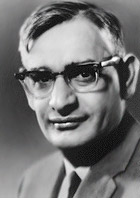 Dr. Khorana was responsible for producing the first man made gene in his laboratory. This historic invention won him the Nobel Prize for Medicine in 1968 sharing it with M.W Nuremberg and R.W Holley for interpreting the genetic code and analyzing its function in protein synthesis. Dr. Khorana`s work is an important scientific landmark of the twentieth century. It has brought closer the day when synthetic DNA may be introduced into the defective human tissues to bring about their repair or treat mentally retarded people and change them into more intelligent and healthy human beings. His synthesis of RNA, capable of replication in laboratory, is a step towards the creation of life artificially. In fact, the researches have opened up a new branch called Genetic Engineering in Science.
Dr. Khorana was responsible for producing the first man made gene in his laboratory. This historic invention won him the Nobel Prize for Medicine in 1968 sharing it with M.W Nuremberg and R.W Holley for interpreting the genetic code and analyzing its function in protein synthesis. Dr. Khorana`s work is an important scientific landmark of the twentieth century. It has brought closer the day when synthetic DNA may be introduced into the defective human tissues to bring about their repair or treat mentally retarded people and change them into more intelligent and healthy human beings. His synthesis of RNA, capable of replication in laboratory, is a step towards the creation of life artificially. In fact, the researches have opened up a new branch called Genetic Engineering in Science.
Dr. Hargovind Khorana, an American molecular biologist of Indian Punjabi origin was born on 9th January 1922. He was born in Raipur, Punjab a poor village now in Pakistan. His father was the village `Patwari` or taxation official. Although poor, his father was dedicated to educating his children and they were practically the only literate family in the village inhabited by about 100 people. Dr. Khorana was married to Esther Elizabeth Sibler of Swiss origin in 1952. They have three children Julia Elizabeth, Emily Anne, and Dave Roy. Dr. Khorana is now settled in America
Dr Khorana attended D.A.V. High School in Multan and took his M.Sc from Punjab University at Lahore. On a government scholarship in 1945 he went to England and obtained a PhD from the University of Liverpool in the year 1948. Dr. Khorana spent a year in Zurich in 1948-49 as a post-doctoral fellow at the Swiss Federal Institute of Technology. He returned to England in 1950 and spent two years on a fellowship at Cambridge and began research on nucleic acids under Sir Alexander Todd and Kenner. His interest in proteins and nucleic acids rose at that time. In 1952 he went to the University of British Columbia, Vancouver on a job offer and there a group began to work in the field of biologically interesting phosphate esters and nucleic acids with the inspiration from Dr. Gordon M. Shrum and Scientific counsel from Dr. Jack Campbell.
He joined the University of Wisconsin as Professor in 1960 and co-Director of the Institute of Enzyme Research and Professor of Biochemistry from 1962 to 1970.to continues his research he became a naturalized US citizen. Khorana continued research on nucleic acid synthesis and prepared the first artificial copy of a yeast gene. Dr. Khorana is also the first to synthesize oligonucleotides, that is, strings of nucleotides. These custom designed pieces of artificial genes are widely used in biology labs for sequencing, cloning and engineering new plants and animals. The oligo nucleotides, thus, have become indispensable tools in biotechnology. In 1970 he became the Alfred Sloan Professor of Biology and Chemistry at the Massachusetts Institute of Technology USA, where he continues to work.
The biological language is common to all living organisms. Dr. Khorana and his team had established that the mother of all codes is spelled out in three-letter words. Their Nobel lecture was delivered on December 12, 1968. Dr. Khorana was also the first to synthesize oligonucleotides, that is, strings of nucleotides. He was the first to isolate DNA ligase, an enzyme that links pieces of DNA together. These custom-designed pieces of artificial genes are widely used in biology labs for sequencing, cloning and engineering new plants and animals. This invention of Dr. Khorana has become automated and commercialized so that anyone now can order a synthetic gene from any of a number of companies. One merely needs to fax the genetic sequence to one of the companies to receive an oligonucliotide with the desired sequence. The oligo nucleotides, thus, have become indispensable tools in biotechnology.
Apart from the Nobel Prize in1968, Dr.Khorana is recipient of many awards and honors for his achievement. `Distinguished Service Award` from Watumull Foundation, Hawaii in 1968; `American Academy of Achievement Award`, Pennsylvania in1971; `Padma Vibushan`, highest Presidential Award from India in 1972; `J.C.Bose Medal` from Bose Institute, Calcutta in 1972 and `Willard Gibbs medal` of the Chicago Section of American Chemical Society in 1973-74. He was elected a member of the National Academy of Sciences, Washington as well as a Fellow of the American Association for the Advancement of Science. In 1971 he became a foreign member of USSR Academy of Sciences and in 1974 an Honorary Fellow of the Indian Chemical Society.






